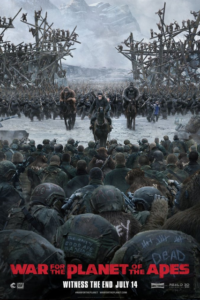Are you a man or an ape? Does it even matter? In “War for the Planet of the Apes,” Ape leader Caesar looks grimly at the little human girl traveling with his secret assassination team. Their mission is confused and clouded by violent revenge. But the innocence of a child could hold the key to the future of all kind, whether ape or man.
The continuation of the now classic “Apes” series resumes, this time with a war on the horizon. But a war between whom is the question for much of the film. And the inheritors of our future world might not be human.
Originally adapted from the 1963 French novel by Pierre Boulle, the “Apes” films and their television incarnations, which began on the big screen in 1968, have become their own distinct sub-genre. Boulle, who also wrote the source material for David Lean’s 1957 film “Bridge on the River Kwai,” ushered in with his writing on “Apes” the idea of an ape evolution. And Boulle’s idea just can’t be dismissed from our popular cultural imagination. With the present trilogy of theatrical adaptations that began anew in 2011, his legacy is secure.
“War for the Planet of the Apes” opens shortly after the events of 2014’s “Dawn of the Planet of the Apes.” Caesar (an award worthy motion capture performance by Andy Serkis) still leads a collection of evolved apes secreted away in the forest. The humans have now united militarily to combat what is perceived as the ape threat. Led by the brutal and skilled military commander known only as the Colonel (Woody Harrelson channeling Colonel Kurtz from “Apocalypse Now”), the goal of the military forces is complete ape genocide.
When the Colonel and his men invade Caesar’s hidden home and kill his wife and son, Caesar embarks on a self-destructive path toward revenge. At one point his journey brings him in contact with a young human girl named Nova (Amiah Miller). Against his instincts, he reluctantly takes her under his care. The little girl is fresh and wide-eyed, yet, incapable of speaking.
Like many of Caesar’s fellow apes, Nova adopts a form of sign language in order to communicate. But Caesar can both speak and sign, and it is this difference from others of his kind that may make his more like a human and less like an ape. Unlike many of his clan, Caesar well knows the love of some humans, but now, he only sees human evility. His bleak almost nihilistic view puts him continually at odds with his species but, also, makes him the perfect leader.
Caesar’s frustrating inability to satisfactorily reconcile serious internal conflicts troubles his trusted advisor, the kind and intellectual Maurice (Karin Konoval). Be more like an ape, less like a man, Maurice cautions. He reminds Caesar that this is why ape Koba met a violent end and ushered in the great war with the humans.
Caesar’s reckless track in pursuit of vengeance makes him more human than ape. He wants to go it alone, but his loyal officers cannot allow him to do that. It is their hope that he will abandon this human need for justice and return to lead his apes to a safe land. Along the way, we learn about the personally destructive power of revenge and about the universal importance of love and family—concepts that aren’t limited to one species.
Featuring the finest example of motion capture effects in the series to date, “War” successfully makes us care deeply about the apes and their struggle. The meaningful narrative raises questions regarding slavery and efficacy of military solutions over diplomatic ones. The satirical social commentary is thick but still potent even after nearly 50 years of cinematic treatment.
Serkis has never been better as Caesar delivering a performance that should be recognized for end of the year awards. The script works brilliantly during its first third and the initial set-up only to falter slightly as it moves into a captivity phase that becomes a little tonally uneven. Still, this is a film that is impossible not to appreciate both for its craftsmanship and heart.
Ape vs. Man? The Colonel’s belief is that the war between the two species is a battle for all life on the planet. His sincere belief is that apes and man cannot peacefully co-exist. But instead of a physical war, the bigger conflict raging in this film is inside sentient beings, whether ape or man. It is an emotional battle that seeks to supplant base instincts with compassion and faith. The broad crudeness of the Colonel’s genocidal mission or Caesar’s misguided and selfish quest for revenge cannot permanently ensure the progress of society. The war is bigger than these two warrior leaders.
As Caesar narrows his intense gaze at Nova coupling with it his furrowed brow as he contemplates his next deadly move, he’s reflecting deeply even as his broken heart aches. The thirst for justice cannot erase his acknowledgement that life is special and should be celebrated. “War for the Planet of the Apes” is an ambitious, special effects laden, satiric, science fiction adventure that tries to force you to ponder life’s most important questions. Ponder on…

